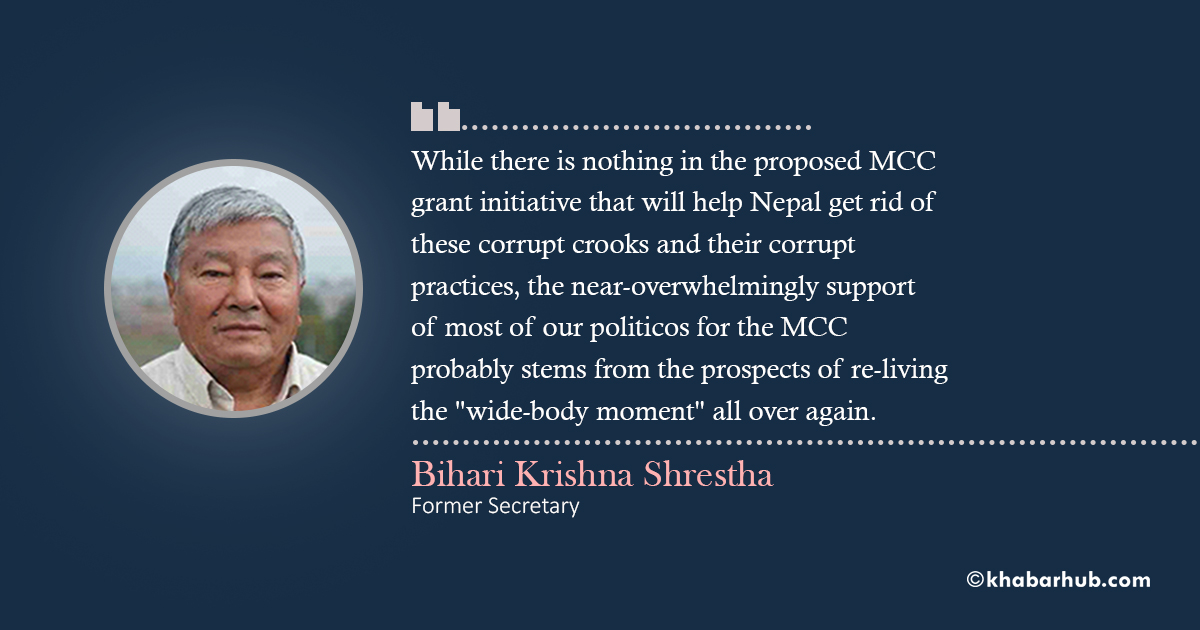Lately, there has been much debate in Nepal, for and against, as to whether the country should accept the Millennium Challenge Corporation (MCC) offer of U$500 million for some vital projects in hydropower and transport sectors.
The proposed assistance, evolving over the years, is now designed to install 300 kilometers of high voltage power lines and a cross-border transmission line between Butwal and Gorakhpur in India, and to invest in upgrading the quality of 300 kilometers of the “strategic road network” in Nepal.
Clearly, they do constitute much needed high-value infrastructure development for Nepal.
The project is also seen as being extraordinarily attractive, because that big sum of money is going to come to Nepal in the form of grant, and would spare Nepal, as some diehard protagonists put it, of a possible “debt trap” for Nepal, an allegation that seems to point at China who is accused, particularly in Western countries and in India, of lending funds liberally under its BRI initiative only to get the borrower to fall into inescapable “debt trap”.
As a former government official myself who spent many years working with a whole range of donor agencies and their big and not-so-big loans for development projects, my own experience has been that all such loans are “debt traps” if one ends up misusing them, especially when the politicians at the helm and at other levels remain corrupt to their bones and their bureaucratic subalterns being no different.
However, what the better-governed countries do is to borrow money in a big way and manage to pay them back on time apparently without any difficulty even as they also manage to restore the economic health of their country with those loans.
There are many such instances, primarily from Europe, the recent big one being Italy who borrowed billions from the IMF and managed to pay it back just a few years later.
So, the lesson for Nepal is: Money is not the critical factor for Nepal’s development; it is the good governance conditions in the country, with politicians behaving as genuine representatives of the people, not the village Thalus (lords) masquerading in the garb of politicians and people’s representatives.
As things stand, it is nearly impossible to spot a politician in Nepal today who does not happen to be corrupt. And given the bhagbanda (sharing) culture of politics–under which politicians in either side of the aisle, i.e. the MPs in the treasury bench and those in the opposition–get their due share of the ill-gotten money as recently reportedly happened in regard to what is now known as the “wide-body scandal”.
That has been the reason why Nepal, even after more than half a century of “democracy” and “development” and billions and billions in foreign grants and loans, continues to remain one of those god-forsaken, unfortunate Least Developed Countries in the world.
While there is nothing in the proposed MCC grant initiative that will help Nepal get rid of these corrupt crooks and their corrupt practices, the near-overwhelmingly support of most of our politicos for the MCC probably stems from the prospects of re-living the “wide-body moment” all over again.
Regarding the MCC itself, it has been around two decades in the making. The US Congress had established it as free-standing, bilateral foreign aid agency designed to apply “a new philosophy towards foreign aid” in 2004, and Nepal had signed the “Compact” on September 14, 2017.
While the Indo-Pacific Strategy itself was devised as long ago as 2006/07 to address the challenges brought about by China’s emerging economic and strategic capabilities, the current Indo-Pacific Strategy has taken its current shape only in 2017 when President Trump announced its formulation in the Vietnam Summit.
A recent (November 4, 2019) US Department of State publication titled, “A Free and Open Indo-Pacific, Advancing a Shared Vision” has laid out its objective of achieving “Free and fair reciprocal trade, open investment environments, good governance, and freedom of the seas”, and carries the picture of Nepal’s foreign minister, Pradeep Gyawali too shaking hand with his American counterpart, Michael Pompeo on page 11.
The fact that MCC constitutes an integral component of the IPS has been more categorically emphasized by the US Acting Deputy Assistant Secretary for South Asia David J Ranz who said during his visit to Kathmandu in May 2019 that “Millennium Challenge Corporation Compact program was one of the most important initiatives being implemented in Nepal under the US Indo-Pacific Strategy.”
Another author, Leigh Hartman, writing in SHAREAMERICA, a site managed by Bureau of Global Affairs of the US State Department, has written in September 2019 that the US considers the IPS as “an ironclad and enduring commitment to” a region that spans from the Pacific Ocean to the Indian subcontinent.
The military leaders in the U.S. Indo-Pacific Command themselves informally refer to it as stretching “from Hollywood to Bollywood”, and “As part of the initiative’s security component, the U.S. works with countries in the region on military training and maritime security.”
And writing in The Diplomat (June 11, 2019) its senior editor, Ankit Panda has mentioned that the “United States expects (its) allies and partners to shoulder a fair share of the burden of responsibility to protect against common threats.”
How do the Chinese view this US initiative? Opining on the IPS Dingding Chen of Jinan University had written in the international webpage, ISPI, in 2018 that “Chinese scholars believe that the geopolitical changes brought about by China’s rise are the main reason Washington is devoting efforts to boost Indo-Pacific alliances, and the Indo-Pacific strategy is intended to hedge against China’s foreign and security policy behavior.”
With its emphasis on “freedom of the seas” in particular, it has been clear from the outset that the IPS and its earlier versions were initiatives to counter China at its own doorsteps.
This brings us to the fundamental question of this article: Should Nepal as landlocked country between China and India be participating in this regional alliance designed to challenge China? In this regard, Nepal should retrospect that while USA has been one of Nepal’s earliest friends it has been more of a fair weather friend. Even as Nepal as a landlocked nation suffered numerous constraints and restrictions including a series of blockades at India’s hand, America never confronted that belligerent South Asian behemoth, now an important ally in IPS, on Nepal’s behalf. As recently as 2015 ascetic Modi’s India had no second thought in once again resorting to that barbaric tool of blockade against earthquake devastated Nepal to interfere in Nepal’s constitution writing, and this time, India, for the first time in its relation with Nepal, had to go through the untold humiliation of having to withdraw it unconditionally and roll out the red carpet for PM Oli in New Delhi. It was because China opened its welcoming doors to Nepal and promised limitless options in support of Nepal.
As things stand, China remains the only hedge for Nepal against belligerent India, and USA never mattered in this respect. Therefore, Nepal must think twice before being allured by the promised $500 million. Nepal must not do anything that would alienate China as our steadfast friend and neighbour to the north. While the Chinese Ambassador to Nepal recently and kindly empathized with Nepal’s need for foreign aid from all possible sources including the MCC, Nepal must not be a part of the US-led regional alliance if, at some point, it is likely to use Nepal as a staging point for activities detrimental to Chinese interest. This must be the overriding consideration for Nepal’s participation in the IPS-affiliated MCC initiative.









Comment